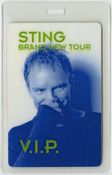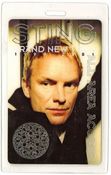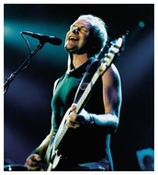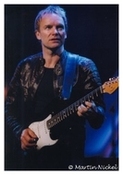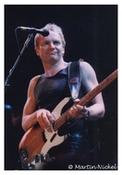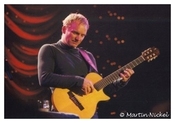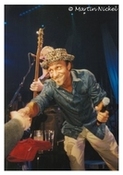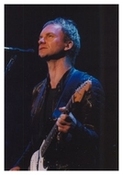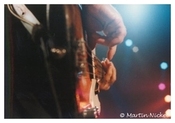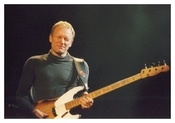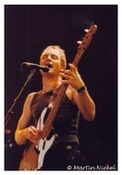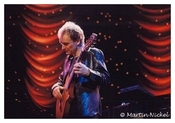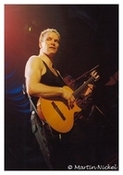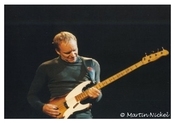
Sting returns to the soul of the Police in his Milan concert - 13,000 people yesterday for the star who will then be at the festival...
Thirteen thousand spectators attended Sting's concert last night at the Forum. He wore a black Armani tank top (present in the audience), an elegant and spartan set, and an initially tedious, then gradually more entertaining overview of his artistic career.
Many great artists have a curious and recurring path: they start with a genre that becomes popular and brings them success. Then they reject it. They rediscover themselves, and the general public loses them. Then maturity arrives, and they regain everything: themselves, the best of their musical history, the money, the hit parade, the large audiences. And in the meantime, they have truly learned to sing and play properly, losing the less pleasant aspects of their personalities along the way. This is the case with Sting, who, starting with the brilliant style of white reggae he invented with the Police, then took a radical turn toward ethnic music, only to reintroduce a bit of everything, including British pop, into his more recent repertoire.
Last night, Sting, in his only concert this season in Italy (we'll see him again on tour in May), debuted with a song with spacey, disturbing sounds and a vaguely millennial feel: "A Thousand Years" from his recent album "Brand New Day," whose central theme is derived from a composition by Bach. And from the same album he revived "After The Rain Has Fallen" (highly rhythmic and engaging, with a wonderful blend of sounds and a use of voice reminiscent of the Police, but also nodding to old certainties like Creedence), and the rapping "Perfect Love...Gone Wrong," although the most intense, captivating, and eye-catching was "Desert Rose," charged with oriental aromas and constructed entirely outside the mold of European music, somewhere between mystery and sensuality.
In addition to "Brand New Day," sung in chorus by the audience, Sting performed two of his songs, distant from each other in time but somehow united by their theme: "Roxanne," a huge Police hit recently covered by George Michael on "Song of the Last Century," and "Tomorrow We'll See." "Roxanne" was the story of a prostitute, while "Tomorrow We'll See" is that of a transvestite with a perfect knowledge of his clients' schedules, habits, tastes, and private lives.
A rigorous concert, featuring an increasingly versatile and mature Sting, who garnered widespread acclaim with classic songs such as "Bring On The Night" and "Every Breath You Take." Sting often addressed the audience in Italian and appeared smiling and relaxed. Among his encores were "Lithium Sunset" and "Fragile." It was a resounding success, and in the meantime, his participation in Sanremo was also confirmed. "I'm very happy," he said, "Pavarotti's presence stimulates me."
(c) Il Corriere Della Sera by Mario Luzzato Fegiz (thanks to Valeria Vanella)
Sting, a river of words. More than singing, he speaks out about the world and Pinochet...
Marinella Venegoni Correspondent in Milan. Sting has now established himself as the master thinker. While the remnants of our "socially engaged" music scene remain noisily silent, the Newcastle singer-songwriter effortlessly moves from a Democrats of the Left (DS) congress to a statement on the news: yesterday, a few hours before taking the stage at the Filaforum in Assago - a sold-out 12,000-seat venue for his only Italian date - the cool blond, who wrote "They Dance Alone" inspired by the mothers of Chilean desaparecidos, spoke out on the thorny Pinochet issue.
"The decision to send him home due to his health is probably the right one," he said, "even if the judgment in this case is a rather complicated matter. It was a missed opportunity for Pinochet anyway: he could have proven his innocence, or he could have apologized; or he could have revealed that he was being guided by dark forces outside the country."
On the showbiz front, Sting confirmed that he will be attending the Sanremo Music Festival for the third time: "I hope to have fun with my friend Pavarotti, and I bonded with Fazio on his show 'Quelli che il calcio.'" Thanks to him and Bono, a team that provided special moments at the Pavarotti International will be reunited under the umbrella of the Jubilee 2000 project for the cancellation of Third World debts.
Before performing at Assago, Sting explained his musical philosophy: "The world is full of problems. The first step to solving them is optimism, and the contribution I can make as a singer is to foster a positive state of mind." The wish was certainly not directed at the Italian media: the megastar who owns more castles than Eulalia Torricelli provided us with a press room in Assago where we could write while sitting on the floor (set up after vigorous protests); and his sponsor (whom we will be careful not to name) slammed the door in the media's face as soon as the megastar came down to greet the executives.
Thank you, Sting, for the warm welcome. And thank you, anyway, for the very long concert last night, which only occasionally reconciled the person with the artist, warming up the music, which is undoubtedly technically impeccable, but as always, cold in its formal perfection. A thousand rhythms pass through the hands of the talented musicians, five plus two backing vocalists who add dark brushstrokes to the sound. Manu Katche transforms into a rapper for "Perfect Love Gone Wrong," replacing French rapper Ste', who sings on the album "Brand New Day." (Sting has stated that he prefers French rap to Yankee rap: "Which is rudimentary and has many fascist intentions: hatred of women, hatred of whites, hatred of everyone.") The play of light on the bare stage is beautiful, even embellished with colorful polka dots. Sting, in a black proletarian Armani tank top (which is in the audience), marries world music with a light, mannered jazz, showcasing much of his earlier work: from "Roxanne" to the Police-era "Every Breath You Take," to "Englishman in New York" (whose atmosphere permeates many other songs) and "Bourbon Street."
Mild and refined boredom, enthusiastic applause.
(c) La Stampa by Venegoni Marinella
Sting brings mature sound to sympathetic crowd...
Perhaps prompted by a recent swing-inflected cover version by pop singer George Michael, Sting set out Tuesday to reclaim one of his most famous songs, the Police's 'Roxanne'.
Though the British singer/songwriter's rock days are long gone, he turned back to that sound at least once at the Forum arena, one of the stops on a European tour continuing through June in support of his recent album 'Brand New Day'.
Originally recorded in 1978 for the debut album of his former band, the Police's 'Outlandos D'Amour', 'Roxanne' ripped through the crowd in a guitar-driven rendition vastly different from the George Michael version included on the covers album 'Songs From the Last Century'.
As Sting explained to the audience, it was how the song was meant to be played: as a desperate plea to a prostitute. ''Roxanne / You don't have to put on the red light / Those days are over / You don't have to sell your body to the light,'' he sang. Red spotlights flashed from the big stage to the 12,000 people gathered in the sold-out arena. The audience, enthralled, sang along.
Roxanne marked the climax of a two-hour, 22-song show centering on material from 'Brand New Day', which was released in October. Dressed head-to-toe in black, the 48-year-old former teacher kicked off the concert with the album's opening track, the slow and atmospheric 'A Thousand Years'. Thereafter, he adhered closely to the bluesy moodiness of such songs as 'After the Rain' and 'Moon Over Bourbon Street, the latter from his 1985 solo debut, 'The Dream of the Blue Turtles'.
''He's definitely grown up. It would be nonsense if he acted like a boy, and the actual sound of his music fits pretty well with that,'' concert-goer Cristiana Ottaviano, 30, said.
Performing old hits such as 'Englishman in New York' from 1987's 'Nothing Like the Sun', as well as more recent tunes, Sting and his seven-piece band showcased its well-honed ability to fuse genres. Sting, who began his world tour in Las Vegas in October, was accompanied by two backing vocalists, Machan Taylor and Darryl Tookes, who added soulful flavoring to such songs as the country-gospel tune 'Fill Her Up'. The jazz-tinged lineup also included longtime Sting sidemen Dominic Miller on guitar and Manu Katche on drums, and newcomers Chris Botti on trumpet and Jason Rebello and Mark Elridge on keyboards.
Sting also reworked a few vintage tunes from his Police repertoire, including an acoustic 'Message in a Bottle', from 'Reggatta de Blanc' (1979), which he performed alone onstage as the second encore. The concert closed with the audience singing along with the 1987 acoustic ballad 'Fragile'.
''Of course he has changed, and so have some of his songs,'' Ottaviano said. ''But the songs are still great, especially the old ones. And though at the beginning of the concert he looked a little cold, he demonstrated he's still a great performer, even if he's now directed toward a more mature audience.
(c) Sonic Net Web-site, Jan 2000 by Gianni Sibilla
Sting, a star for everybody...
After the triumphal selling out of yesterday night's show at the ''FilaForum'', Sting seems the most suited popstar to inaugurate and represent the new century at the horizon.
From the DS congress at Lingotto to Assago, and from his many appearances on TV shows where he regularly talks with intelligence, the ex-Policeman appears to be in the position of being one of the most universal rock artists to dominate the multimedia globality of the 21st century.
A bionic man able to make the best of his considerable vocal and theatrical talent with natural facility and Zen control, the 49 year old musician from Newcastle enchanted the 12-13,000 spectators in the FilaForum without overdoing it, relying on his personal appeal and on the ever high quality of his band. This time there were, among the others, Manu Katche on the drums, worthily substituting for the incomparable Vinnie Colaiuta, and Jason Rebello at the keyboards. If we add the charming choice of songs, new and old from a rich and familiar repertoire, we take for granted the unreserved success of the Milan show which was admired by both young and old alike.
A couple of hours of refined pop music - predictable on occasions but always dignified - that builds to fascinating peaks and conquers with an epic final ovation. You could find many applause-wringing songs: from 'A Thousand Years' to 'If You Love Somebody (Set Them Free)', 'Every Little Thing She Does Is Magic', 'Every Breath You Take', 'Englishman In New York', 'Mad About You', 'Brand New Day', 'Desert Rose', 'Roxanne', until the memorable new version of 'Fragile' that allured Veltroni, D'Alema and the politicians who have no knowledge of rock music.
Is Sting the new Frank Sinatra? It seems so, judging from the swinging, extraordinary ease that he maintained during the whole performance, an elegant show that was not adorned unnecessarily. There is nobody, nowadays, like the fair Gordon Sumner, able to sing songs that are simultaneously refined, cosmopolitan and popular.
With his whole eclectic repertory of falsettos, over-highs and lyric hoarseness, Sting succeeds in reviving the habitual impassiveness of the Anglo-Saxon people, making a brilliant Esperanto of possible contamination, mixing pop, rock, jazz, ethno-world and more sophisticated ballads of an almost classic stamp.
Sting's extraordinary vocation for combining the irreconcilable, betting on a voracious public that indifferently consume radio, tv, CD, video, cinema and concerts, make him one of the few to be able to communicate with everyone. When everything seems to be precarious, volatile and ephemeral, when the fashion is to fawn constantly over idols that last for only the time of an album, Sting renews the hopes for something lasting which unites people with positive values. Beautiful songs talking about peace, clean air, the safeguard of civil rights and a politic that finally faces the essential problems of humanity. ''Pinochet? Just because he's old and sick he's losing a good chance to ask for forgiveness for the harm he did to other people''. In May, the ex-Policeman will be here again to make other seven Italian cities happy.
(c) La Republica by Giacomo Pellicciotti/translated by Stefania Forlani

